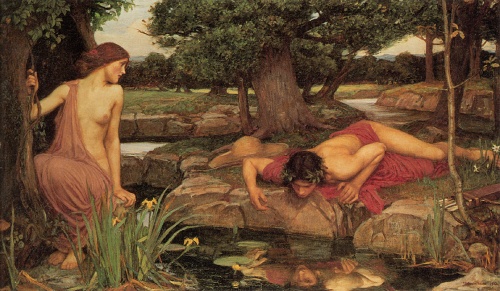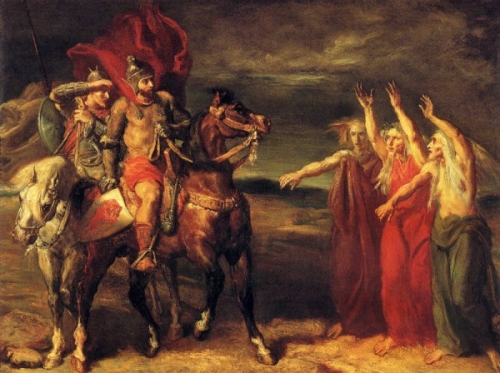
“Being” tends to be an extremely problematic term especially in twenty-first century philosophical and academic discourse. But in the artistic frame of the Narcissus myth, at least, the topic of ontology is chiefly explored through the characters of Echo and Narcissus. They are, in fact, presented at first sight as two distinct and antithetical beings, but they have foundationally similar, unconscious desires. Echo’s desire for union with Narcissus and Narcissus’ desire for union with his own reflection express their deeper, unconscious desires for a unified, complete Self; the failure to achieve such a union results in the dissolution of their beings. The psychoanalytic theories of Jacques Lacan will help us understand the complex relationship (or lack thereof) between the two characters and that which they have with their own Selves.
Lacan provides us with three major theories on the ego, the relationship between the Self and the Other, and desire. Lacan’s fundamental notion on the ego is the ego’s illusory nature. D’Alleva explains that “for Lacan, the ego – the sense of self as coherent, rational actor expressed in the word ‘I’ – is nothing but an illusion of the unconscious”[1]. Moreover, Lacan theorises that the unconscious is structured like language: it is composed of an arbitrary chain of signifiers and signifieds. For Lacan, then, “the process of becoming a ‘self’ is the process of trying to stabilize the chain of signifiers so that meaning – including the meaning of ‘I’ – becomes possible”[2]. With the arbitrary processes of the unconscious in motion, the individual is thus left with the illusion of the “I”, the ego.
The subject’s sense of the Other, according to Lacan, is created when the subject, as an infant, realises that it is separate primarily from its mother, then eventually from the rest of the people around it. The individual’s sense of Self, following the stage of sensing the Other, is brought about in the “Mirror Stage”, a stage wherein a baby sees itself in the mirror, and, seeing its own reflection, creates a concept of its own Self. Such a perceived concept is what Lacan calls a méconnaisance, a misrecognition; for the Self identified in the mirror is only an ontological illusion of the unconscious. The mirror image is what Lacan calls the “Ideal-I”, the ideal sense of Self with which the subject attempts to reconcile the reality of its own self-perception.
Lacan also theorises about the inherent sense of absence in the unconscious. Richter explains that “the sense of absence can take the form of mere lack (manque) or need (besoin), which force the psyche to make demands, or it can take the higher form of desire (désir)”[3]. The solution for the individual’s sense of absence is language: “Lacan says that language is always about loss or absence; you only need words when the object you want is gone”[4]. Language is an attempt to retrieve what is unconsciously absent – it is the bridge that connects the Desiring to the Desired. If language, then, is the noumenal link between the desiring subject to the desired object, the performative and phenomenal expression for desire is the Gaze[5]. D’Alleva says that “according to Lacan, we try to give structure and stability to our illusions, our fantasies of Self and Other, via the Gaze”[6]. The Gaze is, in other words, the medial point between the subject’s self-perception and its Ideal-I wherein the subject’s desire may be apprehended.
Lacan’s theories come into a strong interplay upon contact with the myth of Narcissus and Echo. Our route to unfold the discoveries from the interplay is to examine the stories individually but comparatively, with the overall context of the myth as a guide, and the direct and indirect implications of Lacan’s theories as instruments for insight.
In the myth of Echo and Narcissus, Echo is presented as a personification of her name. She is described in the myth as “a strange-voiced nymph…who must speak / Unless another speak”[7]. Her curse seals her fate as an echoing character: “All she can do is double each last word, / And echo back again the voice she’s heard”[8]. Echo is accordingly a “subject” in Žižek’s sense of the term. Žižek posits that “the subject’s elementary, founding, gesture is to subject itself. . . The subject’s activity is, at its most fundamental, the activity of submitting oneself to the inevitable”[9]. Echo’s curse, in line with a Žižekian perspective, is a curse of eternal verbal passivity. And cursed to be an echoing subject, she is subsequently deprived of a complete sense of Self. What she becomes is a mere signifier, devoid of the meaning and essence that the signified Other, whom she echoes, embodies.
With the absence of a complete sense of self, Echo consequently desires the Other. According to Richter, “it is in the true desire – for an object that is itself conscious and can desire us in return – that higher forms of self-consciousness arise”[10]. In Echo’s desire for the Other there is thus an underlying, ontological desire to complete her Being. If Echo is a Žižekian subject, then Narcissus, in Echo’s perspective, is her corresponding object: “that which moves, annoys, disturbs, traumatizes”[11]. His presence moves Echo into desire. Narcissus is a threefold object: he is Echo’s desired object inasmuch as he is the object with which Echo may achieve the completion of her sense of Being. He is, however – and more importantly – the Lacanian objet petit a, the unattainable object of desire, the object that thus “disturbs”, if not “traumatizes”, Echo.
Narcissus’ rejection and mockery of Echo leads to the literal dissolution of her Being. The myth recounts that “shamed and rejected. . .Her body shrivels. . .Only her voice and bones are left; at last / Only her voice”[12]. Echo’s relationship with Narcissus is a case of the Other responding to the subject with rejection. Echo fails in her to achieve a union the Other, a union which would otherwise have completed her Being, attaching a meaningful Signified to her empty identity as a Signifier. Echo’s body eventually disintegrates, and what is left is only her voice, a signifier of her identity. What is thus most tragic about Echo’s dissolution is that ultimately her story emphasises the ironic and profound emptiness of her character as a Signifier: not only is she deprived of a Signified to give her meaning, but what remains in the end is only a signifier of her Being-as-Signifier[13].
Narcissus, in turn, represents – to borrow a Lacanian term – a “fragmented body”[14] – or, in other words, a fragmented self. In the myth, he is introduced with a question from his mother to Tiresias: “Would he long years and ripe old age enjoy?” to which Tiresias replies, “If he shall himself know”[15]. The prophecy is eventually followed up with a curse granted by Nemesis: “So may he love – and never win his love!”[16] The curse marks Narcissus’ unconscious sense of absence; what he lacks is the perfect self, the Ideal-I. The existence of Narcissus as a character is fated with the curse of an elusive Self, the desire for the illusory Ideal-I. His desire is manifested through his Gaze, as indeed D’Alleva suggests about the action: “we reveal what we desire through the Gaze”[17]. Narcissus is doomed to spend his living moments gazing at his own reflection, desiring a theoretically impossible union with the Ideal-I. Thus, in a Lacanian point-of-view, the character of Narcissus is essentially fixated in the Mirror Stage.
Narcissus’ curse and eternal struggle in the Mirror Stage is brought about by an encounter with an Other, a “scorned youth”[18]. Squillace clarifies Narcissus’ situation for us: “The curse of self-love alights on Narcissus, in fact, from the mouth of a rejected male suitor, by the addition of whom to the traditional story Ovid suggests that what the youth spurns is not Echo per se . . .but any contact outside the circle of himself”[19]. In other words, Narcissus’ futile chase for the Ideal-I is brought about by his rejection of the Other. The concept of the Ideal-I is what Žižek calls the “transcendental I”, a “purely formal function which is neither noumenal nor phenomenal – it is empty, no phenomenal intuition corresponds to it”. Indeed, for Narcissus the Ideal-I is a transcendental illusion manifested in his own reflection. Narcissus, it is said in the myth, “could not clasp himself”[20]. He fails to realise the futility of his actions, and the narrator of the myth notes the dramatic irony: “You simple boy, why strive in vain to catch / A fleeting image? What you see is nowhere; / And what you love – but turn away – you lose! / You see a phantom of a mirrored shape; / Nothing itself”[21]. The curse upon Narcissus works psychologically and ontologically; a theoretically unified Self might have been achieved by him through a union with the Other, but in his rejection thereof he is left with a phantom image with whom union is impossible. What Narcissus consequently experiences is the dissolution of his Being. The myth marks that he is “by love wasted”, until eventually there is “but no body anywhere; / And in its stead they found a flower – behold, / White petals clustered round a cup of gold!”[22] As in the case of Echo, we see a dissolution of the body in Narcissus’ story. What remains is a flower, a signifier of Narcissus’ character. It is an ultimate dissolution of Being: the Signified ceases to exist, and even its signifier is transformed into a symbol, a thing so far removed from the Real in the mimetic order of things. The essence of Narcissus has been dissolved, and what remains of him no longer bears any semblance to his essence.
The two intricately related stories of Echo and Narcissus contain tragic accounts of the unbridgeable boundary between inherent absence and unreciprocated desire. Both characters seek a union that would give them a complete sense of Self and Being, but their failure to do so proves devastating. Echo and Narcissus seem at first to be antinomic characters, and such a perspective may justify the reason for their isolated deaths wherein they dissolve ununified with the other. But even in binary oppositions, theses and antitheses, a synthesis may be produced – unfortunately for the two characters no such synthesis is yielded.
[1] p. 96, Anne D’Alleva, Methods & Theories of Art History (Laurence King Publishing, 2012), 96-105.
[2] D’Alleva ,96.
[3] p.1112, Jacques Lacan, The Mirror Stage in The Critical Tradition: Classic Texts and Contemporary Trends, edited by David H. Richter (Bedford/ St. Martin’s, 2007), 1111-1128.
[4] D’Alleva, 97.
[5] The Gaze, capitalised, is “the process of looking” (D’Alleva, 104).
[6] 104.
[7] Lines 425-427, Ovid, Metamorphoses in The Oxford Anthology of Roman Literature, eds. Peter E. Knox and J.C. McKeown (Oxford University Press 2013), 274-188.
[8] Ovid, 441-442.
[9] p. 17, Slavoj Žižek, The Parallax View (Massachusetts Institute of Technology, 2006).
[10] Richter, 1112.
[11] Žižek, 17.
[12] Ovid, 467-473.
[13] I have capitalised the words Signifier and Signified when they directly refer to the characters in the myth; lower cases implicate everything else.
[14] Lacan, 1126.
[15] Ovid, 416-417.
[16] Ovid, 479.
[17] D’Alleva 104-105.
[18] Ovid, 478.
[19] xxiii in Ovid, The Metamorphoses edited by Robert Squillace (Barnes & Noble Classics, 2005).
[20] Ovid, 505.
[21] Ovid, 508-512.
[22] Ovid, 573, 595-597.

